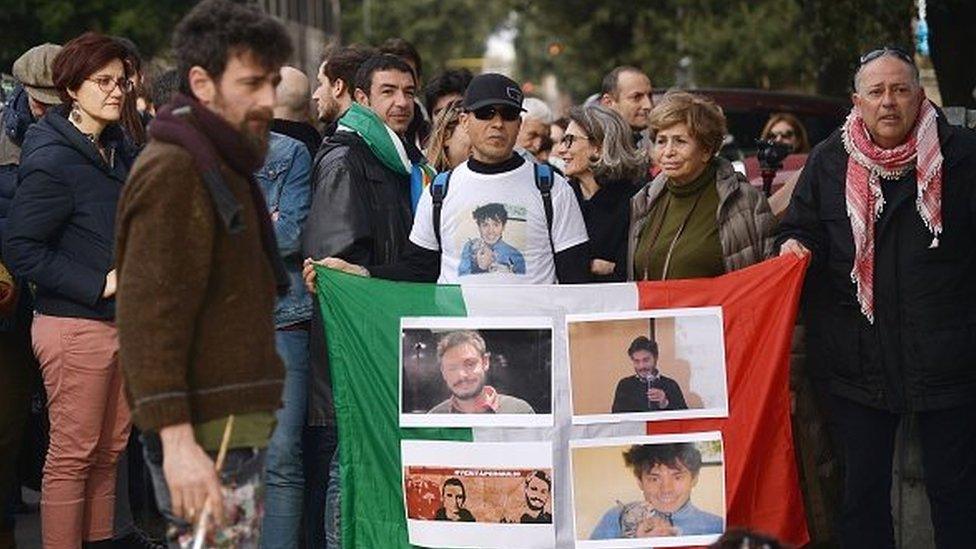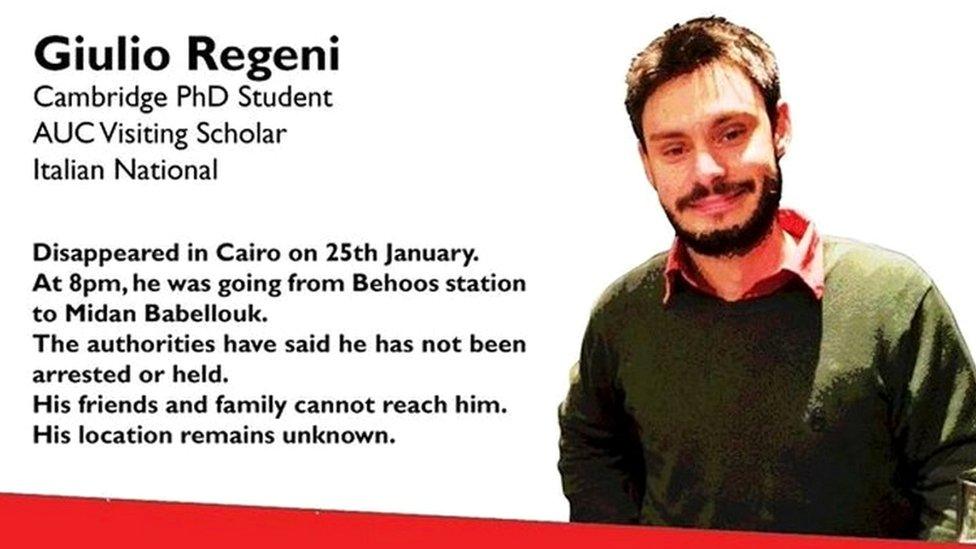Giulio Regeni murder: Italy recalls ambassador to Egypt
- Published

The case has attracted renewed criticism of Egypt's human rights record
Italy has recalled its ambassador to Egypt for consultations over the murder of student Giulio Regeni in Cairo.
It comes after Egyptian officials briefed their Italian counterparts on the investigation into the killing.
Italian Foreign Minister Paolo Gentiloni tweeted, external (in Italian) that Italy wanted "one thing only: the truth about Giulio".
Rights groups have suggested security forces were to blame, but Egypt says a criminal gang was behind his murder.
Mr Regeni, 28, disappeared on his way to meet a friend on 25 January. His body, mutilated and showing signs of torture, was found in a ditch on 3 February.
Swift action
The Italian foreign ministry said it had recalled Ambassador Maurizio Massari for "an urgent evaluation" of what steps to take to "ascertain the truth about the barbaric murder of Giulio Regeni".
Egypt's probe into the death of Mr Regeni came under strong criticism after successive and sometimes contradictory accounts were issued by the Egyptian authorities.
Prime Minister Matteo Renzi has said Italy will not settle for what he called a "convenient truth", and promised swift action if the meeting failed to produce concrete results.
Many in Italy think that Mr Regeni could have been targeted by the Egyptian intelligence services because of his research on trade unions and activism.
The Egyptian team indicated that they were still considering the possibility the student was abducted by an anti-foreigner criminal gang whose members all died in a police shoot-out last month.
In a statement, the Italian prosecutor "reiterated his conviction that there are no elements to directly link the gang to the torture and death of Giulio Regeni".

'A turn for the worse': analysis by Julian Miglierini, BBC News, Rome
The meeting in Rome between detectives from both countries was supposed to mark a turning point in the protracted investigation into Giulio Regeni's death. In the event, it was a turn for the worse.
Italian officials say the Egyptian dossier did not include any new information, like Mr Regeni's mobile phone records or CCTV footage of the area in Cairo where he went missing - so they feel more crucial time has been lost in a probe that they already believed was moving too slowly.
The recall of the ambassador marks the lowest point in a bilateral relationship already strained by the lack of progress in the investigation. Two major trade partners are at odds over a death that has brought international attention to what many believe is a violent crackdown on dissent under the current Egyptian government.
Giulio Regeni's family think he was targeted because of his doctoral research. They remain no closer to discovering the truth of what happened to him.

Giulio Regeni's murder: What we know

This poster was released in January after Mr Regeni went missing
The 28 year old disappeared on 25 January, the fifth anniversary of the uprising against President Hosni Mubarak, while there was a heavy police presence in Cairo.
His body was found a week later in a ditch on the outskirts of Cairo, showing signs of severe torture.
Egypt's initial autopsy report said Giulio Regeni had been hit on the back of the head with a sharp instrument.
Much of the evidence of torture came to light in a second autopsy by Italian doctors. Italy's Interior Minister Angelino Alfano said Mr Regeni had suffered "something inhuman".
As a PhD student at the University of Cambridge, Mr Regeni was carrying out research on trade unions and labour rights in Egypt, a sensitive topic in recent years.
Rumours about possible involvement of Egypt's security services in the killing have been reported by the Italian press, activists and opposition groups.
Cairo investigators have suggested that Mr Regeni was kidnapped and killed by a criminal gang posing as members of Egyptian police.
Police then said they had killed all five members of the alleged gang in a raid and recovered some of Mr Regeni's personal belongings.
Mr Regeni's family say they are adamant their son was killed by Egyptian authorities and that the criminal gang theory is a cover up.